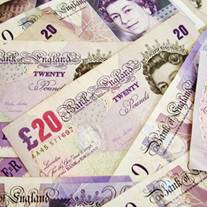If you've got a charity credit card, ditch it now! This isn’t being miserly, its because there’s a better way; you can donate EIGHT TIMES more, without spending an extra penny. Most charities would only receive a paltry £55 if you spent £16,000 on their branded credit card; yet instead there’s a way to get your plastic to give £440!

Cash to charity
How charity credit cards work
Charity cards are a hideous scam, selling us poor value credit cards on the pretence we're doing some good. In reality, it just means more profits for the banks. When you get a charity card, the charity automatically receives between £5 and £25. yet after that most charity cards donate a paltry 0.25% of everything you spend. That's just 25p per £100 spent.
Admittedly a very few charity cards do pay a little more; for example Amex Red gives 1% of everything you spend to the Global Fund to help fight AIDS in Africa, and the Virgin Charity Card pays 0.8% to charity (you can pick from a list), and has a nice option to still give via Giftaid (more details below)
Yet even so, by taking two simple steps, one of which bizarrely uses another of Amex's cards, you can supercharge your charity giving.
How to massively boost the gain
If you use a charity card, ditch it and replace it with the following technique and your chosen charity could be much, much, much better off.
Step One. Get a top cashback credit card
Cashback credit cards are very similar beasts to charity cards; yet rather than paying the charity, they pay you a small percentage of every spend made. However the big difference is that the best cashback cards pay you substantially more than charity cards give your chosen good cause; this can be up to £5 per £100 spent. So switch to one of these (see the Top cards section later) and you get more and can then donate it.
Step Two. Donate the money via Gift Aid so the charity can reclaim the tax.
If you donate money to a UK charity, provided you're a taxpayer, then tick the 'Gift Aid box' on the donation form, and the charity can claim back the tax you paid on that money when it was earned. This means for every £1 a basic rate taxpayer gives, the charity actually receives £1.28, and it doesn't cost or impact you in any way (read the full charity giving article).
This is actually even better than standard tax relief at the moment. The basic rate income tax rate dropped to 20% in 2008, which would mean a charity should receive £1.25 per £1 donated. However, the Government's implemented a 'transitional tax relief' to bump this up by 3p, to £1.28, until 2011.Compare this to what happens with the charity cards. There the donation doesn't qualify for Gift Aid tax relief; so for every £1 that goes to charity, the charity only gets the £1, nothing more.
For higher rate taxpayers, Giftaid works even better. Declare the donations made on your self-assessment tax return, and you can claim back the rest of your tax too. This is an EXTRA 25p per £1.00 you've donated; meaning donate this too and in total your charity receives 50% more than it would have done without any Gift Aid relief.
The Top Cashback Cards
Any cashback card paying 1% cashback or more will beat even the very best charity cards. The current top pick is:
The overall winner: Amex Platinum 5% for 3 months and up to 1.25% after
The American Express Platinum* card pays new cardholders a massive 5% cashback, which is 5p per pound spent, on up to £2,000 spending during the first three months. Once this intro offer expires, its rates are tiered paying a maximum 1.25% cashback. It has a 19.9% representative APR.
It’s worth being aware though that Amex cards are less accepted than Visa or Mastercard and thus you won’t be able to use it everywhere (especially small restaturants & independent retailers - read Who does & doesn't take Amex? discussion. So best practice is to have another cashback card as a reserve.
Also, a couple of warnings are necessary. Spend under £3,000 per year (from the date you get the card) and Amex won't pay you ANY cashback at all. Even more severely, spend nothing on it in a twelve month period and you'll be hit with a £20 dormancy fee. The solution's simple; if you'll spend less than £3,000 a year, go for the next best card.
Intro Cashback. 5% for 3 months on up to £4,000. Standard Cashback. 0.5% on up to £3,500/year, 1% on £3,500 to £7,500k/year and 1.25% above that. Min. Salary Requirement: £30,000 per household. Representative variable rate: 19.9%. Official APR examples
For more options see the full best cashback credit cards article
How to make the most of cashback cards
Once you've picked a cashback card, there's a couple of things you should do to make the very most out of it. Sticking to these will ensure your donation is as big as possible, while costing you the minimum it can.
Always repay it in full.
If you remember one thing about cashback cards, and for that matter charity credit cards too, the ensure its the 'Golden Rule'. Only use one of these cards if you never pay a penny of interest, meaning you pay the card off in full every month. Fail to do this and the interest cost massively dwarves the cashback earned, negating any benefit to you or the charity. In that case you'd be far better off with the top 0% card for spending and donating some of the interest you save.
It's simple to get around this; set up with a Direct Debit to pay it off IN FULL. Sadly some card providers deliberately miss this option off their DD forms, as it's highly unprofitable for them. If so, just write in ‘pay off in full' and send it in; they should honour it, though call up after a week or so and check it's in place.
Use it for as much spending as possible
Those who do pay off in full each month should maximise spending on the card even replacing debit card, cheque and cash transactions. After all as there's no interest cost you've effectively turned your credit card into a debit card, just one that pays you when you spend on it. This way you maximise the returns and your charity is effectively getting paid whenever you spend. Most cashback cards tend to pay out once a year, so at that point you can do the donation in one go.
Are there any advantages to charity cards?
Maybe a small one, but it won't work for everyone. If you apply for multiple cards that offer a bonus donation when you open them, then the charities can get cash without it costing you a penny. yet this will only work if you have a good credit score.
The more 'credit searches' on your file, the less likely you are to get decent new credit in future, especially with the omnipresent Credit Crunch looming large. If you are likely to need credit to make debts cheaper, be very careful about how many applications you make for the sake of a few quid to charity. It's probably best just to donate the money yourself.
This is actually avery similar system to the one I talk about in the Credit Card Freebies article, so if you are interested in doing it, it's worth reading my explanation on the impact on your credit score there.
Think before adding the 'insurance'
Payment protection insurance is commonly sold with credit cards - the idea is it'll make some payments for you, usually for a year, if you are unable to (eg, if you lose your job).
There have been a myriad of cases where it has been missold eg, borrowers didn't realise they were signing up for it, or it was totally unsuitable for them, and some big lenders have been fined.
The protection isn't always bad, though policies sold with cards are often overpriced (you pay a monthly amount depending on the size of your balance). If you want it, compare the lender's cover with standalone providers such as Paymentcare or Best Insurance.
Always be vigilant to check you aren't getting more than you bargained for when you fill in the application, then check your statement each month to check you aren't inadvertently paying for extras if you didn't ask for them.

This method does take more discipline than a charity card, but discipline pays substantially. For example use The Co-op Bank's Children Society card for £16,000 spending a year (not unreasonable if it replaces debit card and cash transactions) and the charity receives £55, including £15 sign-up bonus.
Instead, spend on Amex Platinum* and you'll receive £350 cashback. Donate this and the charity can reclaim £87.50 on top. Plus, higher rate taxpayers can reclaim the tax, if they choose to donate that too it's a further £87.50. Overall it means it's earning £525 compared to the charity cards paltry £55.
Spending of £16,000/year
|
Cashback/Charity Payment |
Amount the charity receives |
The Charity Gains | ||
Basic Rate |
Higher Rate (1) |
|||
Children's Society card |
£55 |
£55 |
£55 |
- |
Amex Platinum |
£350 |
£437 |
£525 |
£470 |
(1) Assumes tax reclaimable is gifted to charity as well (2) £5 sign up fee, £10 for spending on it, and 0.25% of transactions |
||||
Ask a Question/ Forum Discussion
Charity Credit Cards
Spotted out of date info/broken links?
Email brokenlink@moneysavingexpert.com to let us know
Always double check the product details before signing up to them

LINKS THAT HELP THIS SITE (all have a * in above article)
(this has no impact on product or pick - see explanation below)
Amex Platinum
Explanation (of * links)
How this site is funded. Two types of contacts are listed. The first, which all have a * within the main body of the articles, help MoneySavingExpert.com stay free to use, as they're 'affiliated links' which invisibly take you usually via affiliate linkage or commercial money sites, which then pay this site. It's worth noting this means the third party used may be named on any credit agreements. The second type doesn't help and therefore doesn't have a *.You shouldn't notice any difference, the links don't impact the product at all and the editorial line (the things we write) is NEVER impacted by the revenue - we aim to look at all available products. If it isn't possible to get an affiliate link for the best product, it is still included in exactly the same way. For more details read how this site is financed.
LINKS THAT DON'T HELP THIS SITE
(please only use if necessary)
No * Link Available: Amex Red , Best Insurance , Paymentcare
Duplicate links of the * links above for the sake of transparency, but this version doesn't help MoneySavingExpert.com:
Amex Platinum


























